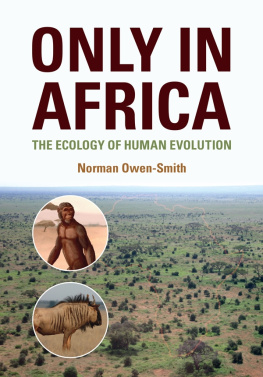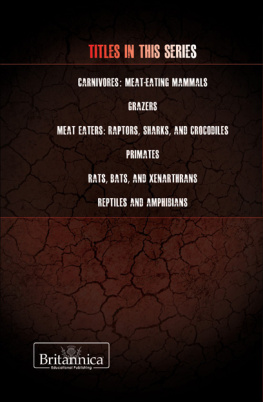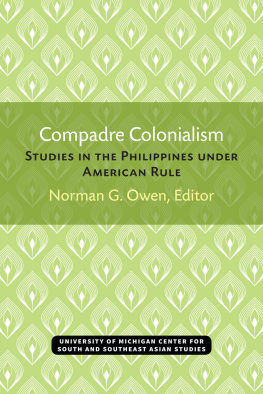Norman Owen-Smith - Only in Africa: The Ecology of Human Evolution
Here you can read online Norman Owen-Smith - Only in Africa: The Ecology of Human Evolution full text of the book (entire story) in english for free. Download pdf and epub, get meaning, cover and reviews about this ebook. year: 2021, publisher: Cambridge University Press, genre: Romance novel. Description of the work, (preface) as well as reviews are available. Best literature library LitArk.com created for fans of good reading and offers a wide selection of genres:
Romance novel
Science fiction
Adventure
Detective
Science
History
Home and family
Prose
Art
Politics
Computer
Non-fiction
Religion
Business
Children
Humor
Choose a favorite category and find really read worthwhile books. Enjoy immersion in the world of imagination, feel the emotions of the characters or learn something new for yourself, make an fascinating discovery.
- Book:Only in Africa: The Ecology of Human Evolution
- Author:
- Publisher:Cambridge University Press
- Genre:
- Year:2021
- Rating:4 / 5
- Favourites:Add to favourites
- Your mark:
- 80
- 1
- 2
- 3
- 4
- 5
Only in Africa: The Ecology of Human Evolution: summary, description and annotation
We offer to read an annotation, description, summary or preface (depends on what the author of the book "Only in Africa: The Ecology of Human Evolution" wrote himself). If you haven't found the necessary information about the book — write in the comments, we will try to find it.
Only in Africa: The Ecology of Human Evolution — read online for free the complete book (whole text) full work
Below is the text of the book, divided by pages. System saving the place of the last page read, allows you to conveniently read the book "Only in Africa: The Ecology of Human Evolution" online for free, without having to search again every time where you left off. Put a bookmark, and you can go to the page where you finished reading at any time.
Font size:
Interval:
Bookmark:
Only in Africa
The Ecology of Human Evolution
That humans originated in Africa is well-known. However, this is widely regarded as a chance outcome, dependent simply on where our common ancestor shared the land with where the great apes lived. This volume builds on from the Out of Africa theory, and takes the view that it is only in Africa that the evolutionary transitions from a forest-inhabiting frugivore to savanna-dwelling meat-eater could have occurred. This book argues that the ecological circumstances that shaped these transitions are exclusive to Africa. It describes distinctive features of the ecology of Africa, with emphasis on savanna grasslands, and relates them to the evolutionary transitions linking early ape-men to modern humans. It shows how physical features of the continent, especially those derived from plate tectonics, set the foundations. This volume adequately conveys that we are here because of the distinctive features of the ecology of Africa.
Norman Owen-Smith headed the Centre for African Ecology at the University of the Witwatersrand before his retirement as Emeritus Professor there. He is an A-rated scientist and Fellow of the Royal Society of South Africa. He received Gold Medals from the Zoological Society of Southern Africa and the South African Association for the Advancement of Science, Wildlife Excellence Award from the Southern African Wildlife Management Association, Honorary Life Membership in the Ecological Society of America, and was awarded a Harry Oppenheimer Fellowship in 2005. He has written or edited six books, including Megaherbivores: The Influence of Very Large Body Size on Ecology (Cambridge University Press, 1988) and Adaptive Herbivore Ecology: From Resources to Populations in Variable Environments (Cambridge University Press, 2002).
Only in Africa
The Ecology of Human Evolution
Norman Owen-Smith
University of the Witwatersrand


University Printing House, Cambridge CB2 8BS, United Kingdom
One Liberty Plaza, 20th Floor, New York, NY 10006, USA
477 Williamstown Road, Port Melbourne, VIC 3207, Australia
314321, 3rd Floor, Plot 3, Splendor Forum, Jasola District Centre, New Delhi 110025, India
103 Penang Road, #0506/07, Visioncrest Commercial, Singapore 238467
Cambridge University Press is part of the University of Cambridge.
It furthers the Universitys mission by disseminating knowledge in the pursuit of education, learning, and research at the highest international levels of excellence.
www.cambridge.org
Information on this title: www.cambridge.org/9781108832595
DOI: 10.1017/9781108961646
Norman Owen-Smith 2021
This publication is in copyright. Subject to statutory exception and to the provisions of relevant collective licensing agreements, no reproduction of any part may take place without the written permission of Cambridge University Press.
First published 2021
Printed in the United Kingdom by TJ Books Limited, Padstow Cornwall
A catalogue record for this publication is available from the British Library.
ISBN 978-1-108-83259-5 Hardback
ISBN 978-1-108-95966-7 Paperback
Cambridge University Press has no responsibility for the persistence or accuracy of URLs for external or third-party internet websites referred to in this publication and does not guarantee that any content on such websites is, or will remain, accurate or appropriate.
The author and publisher have acknowledged the sources of copyright material where possible and are grateful for the permissions granted. While every effort has been made, it has not always been possible to identify the sources of all the material used, or to trace all copyright holders. We would appreciate any omissions being brought to our attention.
This book is dedicated to my extended family: my much-loved wife Margie, daughters Trishya and Lynne, and all of my former students.
Picking through a pile of elephant dung with a twig, quizzically chewing a leaf from a newly identified plant, interrupting a conversation to clap binoculars to his eyes and scrutinise something moving in the distance that is the characteristic behaviour of Norman Owen-Smith in his preferred habitat, African savanna. His keen curiosity about nature is combined with an incisively analytical mind and seemingly inexhaustible capacity for integrating his observations and ideas into the published literature. Driven by his enthusiasm for science, it was inevitable that Norman would achieve the international recognition that he has today as a leader in the field of animal ecology. Now, this book exemplifies his meticulous style of investigation, analysis and inference. It is a personal synthesis of Normans observations, notes and photographs collected during a rich career involving extensive travels across Africa. Generously integrated with information and ideas from the literature, the book not only reviews African savanna ecology and human evolution, but also articulates an important message for humanity. The message that it is only in Africa that humans could have evolved is as provocative as it is compelling from the line of reasoning laid out with characteristic rigour in this book.
It all stems from a sequence of unconnected events and circumstances, like an asteroid slamming into a planet. That happens all the time, somewhere in the universe, but when a particularly big one slammed into Earth about 66 million years ago the implications for the biosphere were profound. Non-flying dinosaurs and many other groups of organisms quickly died out, opening a game-changing evolutionary opportunity for our mongoose-sized mammalian ancestors. Over the next 60 million years, while the mammals radiated into a diversity of taxa over a widening range of body sizes and trophic niches, plate tectonics moved the continents around and broke them up. Different assemblages developed on different continents that had different shapes and positions on the Earths crust. By the time the common ancestor of humans and chimpanzees evolved, it occupied a species range in the middle of the big and geologically complex continent we call Africa, positioned squarely over the equator. That was crucial, because climatic cycles caused by the eccentric Earth-around-Sun orbit drove advances and retreats of the equatorial forest, taking 100,000 years per cycle. When the forest advanced, it covered mountains, plains and valleys; when it retreated, it left refugia of montane forest in a matrix of savanna. That forestsavanna ecotone, advancing and retreating at a rate suiting the speciation of large mammals, was the species pump that drove the dramatic radiation of wildlife (as we now view it) in African savannas. And among those radiating species there just happened to be a bipedal savanna-adapted large primate making its evolutionary appearance in just the right place and at just the right time. It coexisted with perennial supplies of big carcasses to scavenge from, diverse plant communities to gather from, and dry grass and wood to fuel lightning fires that could be weaponised and harnessed, sparking a complex social system.
Such is the sequence of events and circumstances that allowed the highly branched tree of human evolution to take root, and could only have , in African savannas, as Norman Owen-Smith explains here. Paradoxically, the biodiversity of African savannas particularly the megafauna that sustained our ancestral scavengers is now being shredded by the very species it spawned. This important book, by outlining the unique significance of African savannas for humanity, should leave readers with added resolve to conserve our ancestral habitat.
Font size:
Interval:
Bookmark:
Similar books «Only in Africa: The Ecology of Human Evolution»
Look at similar books to Only in Africa: The Ecology of Human Evolution. We have selected literature similar in name and meaning in the hope of providing readers with more options to find new, interesting, not yet read works.
Discussion, reviews of the book Only in Africa: The Ecology of Human Evolution and just readers' own opinions. Leave your comments, write what you think about the work, its meaning or the main characters. Specify what exactly you liked and what you didn't like, and why you think so.








